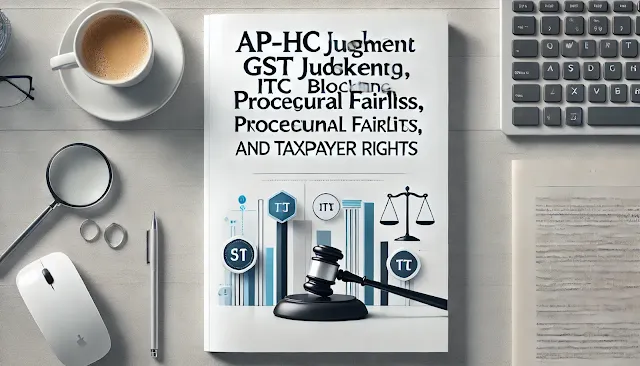AP HC's Key GST Judgment on ITC Blocking, Procedural Fairness, and Taxpayer Rights
The Andhra Pradesh High Court recently ruled on an important case involving Usman Enterprises Vs. Assistant Commissioner ST and Others. This case has significant implications for GST compliance, procedural fairness, and taxpayers’ rights. In this article, we analyze the judgment in detail, highlighting key takeaways for businesses and tax professionals.
Case Background:
Usman Enterprises, a registered taxpayer under the Goods and Services Tax (GST) Act, was subjected to scrutiny by the Assistant Commissioner of State Tax. The case arose due to allegations of non-compliance with GST provisions, resulting in the blocking of input tax credit (ITC) without prior notice.
The taxpayer contended that the department's action was arbitrary and in violation of principles of natural justice, as no valid show-cause notice was issued before restricting ITC. Additionally, the company argued that it had duly complied with GST regulations and that the tax authorities failed to provide proper reasoning for their decision. This led to legal proceedings before the Andhra Pradesh High Court, where the key issues centered around procedural fairness and adherence to GST laws.
Key Issues Raised:
1. Legality of ITC blocking – Was the restriction imposed in compliance with the GST Act and relevant rules?
2. Violation of Due Process – Did the tax authorities follow the mandated legal procedures before taking action?
3. Implications on Businesses – How does this ruling affect taxpayers facing similar disputes?
Court’s Observations and Judgment
The High Court meticulously analyzed various aspects of the case, including the legality of the tax department’s actions, adherence to procedural fairness, and compliance with established judicial precedents. The judgment addressed key concerns related to the protection of taxpayers' rights under GST law.
1. Violation of Natural Justice
-The court observed that Usman Enterprises was not provided with an adequate opportunity to present its case before the Input Tax Credit (ITC) was blocked.
-It was found that the Assistant Commissioner failed to issue a valid show-cause notice in accordance with Section 73 and Section 74 of the CGST Act, which deal with demand and recovery proceedings.
-As per the principles of natural justice, any penal action must be preceded by an opportunity for the taxpayer to be heard, which was completely disregarded in this case.
2. Arbitrary Blocking of ITC
-The department froze the ITC of Usman Enterprises without proper justification, thereby violating the taxpayer’s fundamental rights under GST law.
-The court highlighted that ITC is a vested right, subject to compliance with GST provisions, and cannot be arbitrarily restricted by tax authorities.
-The ruling reaffirmed that blocking ITC without citing clear legal grounds is unlawful and can be challenged in court.
3. Importance of Proper Communication and Due Process
-he court emphasized that tax authorities must issue clear, well-reasoned notices and allow the taxpayer to respond before taking any coercive action.
-The failure of the department to communicate effectively resulted in unnecessary litigation and hardship for the taxpayer.
-The judgment set a strong precedent, indicating that lack of transparency and arbitrary decision-making by GST officers will not be tolerated by the judiciary.
4. Precedents and Legal Framework
-The court referred to previous rulings that reinforce the requirement for due process in tax matters.
-It was noted that similar cases have been overturned where tax authorities failed to adhere to proper legal procedures.
-The ruling aligned with broader judicial principles emphasizing protection against unjust and arbitrary administrative actions.
Key Takeaways from the Judgment
This case reinforces several crucial legal principles for businesses, tax professionals, and GST authorities:
1. Mandatory Due Process
-Authorities must issue a valid show-cause notice before taking any restrictive action such as blocking ITC.
-Failure to follow this requirement can lead to judicial intervention and reversal of the decision.
2. Taxpayer’s Right to Be Heard
-Any penal action must follow the fundamental right to be heard before enforcement.
-Courts have consistently ruled against actions taken without fair communication.
3. Judicial Oversight on GST Compliance
-Arbitrary or unlawful actions by tax officials are subject to judicial scrutiny.
-Courts uphold transparency, fairness, and adherence to GST legal frameworks.
4. Implications for Compliance & Litigation
-Businesses must maintain meticulous GST documentation to challenge any unlawful restrictions.
-Tax professionals should guide clients in navigating compliance and seeking legal recourse when necessary.
-GST authorities should ensure lawful and transparent actions to avoid adverse court rulings.
Impact on Businesses and Taxpayers
For Businesses:
-Maintain accurate GST filings, invoices, and reconciliations to minimize risks.
-Monitor any notices or communications from tax authorities and respond promptly.
-Implement internal compliance checks to ensure input tax credit (ITC) claims are valid.
For Tax Professionals:
-Stay updated on recent GST case laws and legal precedents.
-Assist clients in challenging arbitrary actions through legal representations.
-Educate businesses on procedural safeguards under GST law to avoid disputes.
For GST Authorities:
-Ensure due process is followed before blocking ITC or imposing penalties.
-Improve transparency in communications to prevent unnecessary litigation.
-Adhere to legal principles and judicial guidelines to maintain taxpayer trust.
Conclusion
The Andhra Pradesh High Court’s ruling in Usman Enterprises Vs. Assistant Commissioner ST sets a crucial precedent. It reinforces taxpayer rights, procedural fairness, and the importance of due process in GST matters. Businesses must stay informed about such rulings to safeguard their interests, while tax authorities should ensure compliance with the principles of natural justice.
For professionals dealing with GST litigation, compliance, and advisory services, this case serves as a key reference point. Stay updated with GST legal developments to navigate the evolving tax landscape effectively.
